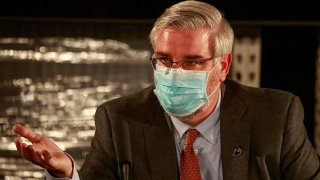
Indiana Gov. Eric Holcomb on Wednesday condemned recent comments made by the state's attorney general, who alleged that Indiana’s COVID-19 data is inflated and “inaccurate.”
The Republican governor said he was “stunned and somewhat blindsided” by Indiana Attorney General Todd Rokita's claims that non-COVID illnesses or deaths in the state have been “inappropriately categorized as COVID."
“That, to me, hit home. It’s quite serious when you accuse or insinuate anyone of inflating numbers,” Holcomb said during a news conference Wednesday. “In my book, that’s called fraud. If there is a shred of evidence, he or others need to take that to the Inspector General of the State of Indiana.”
Rokita, also a Republican, said in a series of tweets Tuesday that a “lack of standardization” in how the state collects and reports COVID-19 data has led to “reporting irregularities,” and suggested that “monetary and other motivations” could also cause numbers to be mispresented.
Days earlier, Rokita said during an interview with WSBT-TV that he “(doesn't) believe any numbers any more,” and called the state-collected data "politicized since day one.”
“I believe it's just attempting to fan the flames of confusion, and that’s exactly what we don’t need at this time,” Holcomb said.
The governor said Rokita has not contacted him about his statements, and that he does not have plans to speak with the state attorney general about the claims.
Local
In a statement responding to the governor, Rokita denied that the collection of COVID-19 data is an inspector general issue. “This isn’t about fraud at this point, it’s about inaccurate numbers and political agendas causing doubt," he said.
Holcomb's reprimand came amid continued concerns from the state's top health officials over recent increases in COVID-19 cases and hospitalizations, coupled with sluggish vaccination rates among Hoosiers.
Feeling out of the loop? We'll catch you up on the Chicago news you need to know. Sign up for the weekly Chicago Catch-Up newsletter.
The weekly risk assessment from the Indiana Department of Health released Wednesday placed 27 of the state’s 92 counties at the highest risk level of coronavirus spread, with all others in the next-highest “moderate spread” category.
Cases of the virus in adults under 40 and in children account for “a large proportion” of recent new cases, the state Health Department’s chief medical officer Dr. Lindsay Weaver said Wednesday. School cases also increased before the winter break to some of the highest levels recorded in months.
The number of people hospitalized with COVID-19 in Indiana has increased by more than 700% since June, and the state's hospital census is now at the highest level in five years, she continued.
“We’re often seeing patients being held in the emergency room for hours and sometimes days until a bed (becomes) available which is difficult for the patient, their family and for the staff,” Weaver said. “It is heartbreaking to have people arrive in distress from COVID knowing their severe illness could have been prevented by vaccine.”
The Indiana Department of Health reported Wednesday that 54.6% of Indiana residents 18 and older are fully vaccinated. State Health Commissioner Dr. Kristina Box said it was “critical” that more Hoosiers get vaccinated, especially those between the ages of 5 and 59.
She noted, too, that the state is struggling to get ahold of rapid tests, which has led to “overwhelming demand” and hourslong lines at state testing sites, including the Indianapolis Motor Speedway. She said health officials are now “diligently looking” for other sources of rapid tests.
“This situation will get worse before it improves,” Box said. “We expect to see a very steep rise in cases over the next several weeks."
Holcomb additionally announced Wednesday that he extended the statewide COVID-19 public health emergency into the new year following a failed attempt by legislators to quickly approve steps the governor sought to let the declaration expire.
The governor signed the 22nd monthlong extension of the public health emergency he first issued in March 2020 along with an executive order continuing a handful of administrative actions but no business or crowd restrictions. Both orders are in effect until Feb. 1.
Holcomb’s emergency order said about 96% of recent COVID-19 hospitalizations and 79% of deaths in the state involved unvaccinated people and stated that “the virus remains a threat to the health, safety and welfare of all residents of Indiana.”



